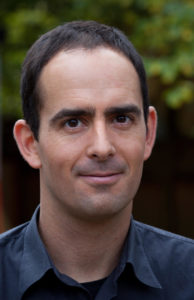Reuven Gordon
Quantum Plasmonics: Trapping Single Erbium Emitters, Bright Upconversion by Light Induced Tunneling and Below Bandgap THz Generation
Reuven Gordon , Ph.D., P. Eng., Fellow OSA, Fellow SPIE, Fellow IEEE
Professor, Electrical and Computer Engineering, University of Victoria, BC Canada
Abstract:
Plasmonic enhancement allows for light-matter interaction at the sub-nanometer scale. Here I will describe three plasmonic-enhanced experiments: (1) trapping single Erbium ion emitters, (2) generating bright up-converted light from light-induced tunneling and (3) below-bandgap THz generation. These demonstrations have applications in telecom-band single photon sources for quantum information technologies, in bright ultrafast near-field light sources and in highly-efficient and low-cost THz devices.
Bio:

Reuven Gordon is a Professor in the Department of Electrical and Computer Engineering, University of Victoria. He has received a Canadian Advanced Technology Alliance Award (2001), an Accelerate BC Industry Impact Award (2007), an AGAUR Visiting Professor Fellowship (2009), the Canada Research Chair in Nanoplasmonics (2009-2019), the Craigdarroch Silver Medal for Research Excellence (2011), a Fulbright Fellowship (2016), an NSERC Discovery Accelerator (2017), the Faculty of Engineering Teaching Award (2017) and an JSPS Invitational Fellowship (2020). He is a Fellow of the Optical Society of America (OSA), the Society for Photographic Instrumentation Engineers (SPIE), and the Institute for Electrical and Electronic Engineers (IEEE). Dr. Gordon has authored and co-authored over 170 journal papers (including 13 invited contributions). He is co-inventor for five patents and two patent applications. Dr. Gordon is a Professional Engineer of BC. Dr. Gordon has been recognized as an “Outstanding Referee” by the American Physical Society. He has also served as conference chair for several conferences, including SPIE NanoScience + Engineering and NFO16. Dr. Gordon is an Associate Editor for Optics Express and on the Editorial Advisory Board for Advanced Optical Materials.
